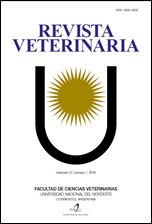Efficacy of the probiotic strain <i>Enterococcus faecalis</i> CECT7121 in diarrhoea prevention in newborn foals
DOI:
https://doi.org/10.30972/vet.2711075Palavras-chave:
foal, neonatal diarrhoea, Enterococcus faecalis CECT7121, probiotic, efficacy.Resumo
The aim of this work was to assess the effectiveness of the probiotic strain Enterococcus faecalis CECT7121 for the prevention of neonatal diarrhea in one to three day-old foals. Fecal samples from twenty foals divided randomly in experimental and control groups were studied. The experimental group (n=10) received E. faecalis CECT7121 (1 x 1010 CFU/ml) orally in the first day of life and for a 6 days period. The control group (n=10) received distilled water for the same period. In 4/10 of the foals from the control group diarrhea was observed, conversely diarrhea cases were not observed in any of the foals belonging to the experimental group. The differences between groups were statistically significant (p<0.001). E. faecalis CECT7121 was isolated in faeces from the second day of treatment until six days after the end of the probiotic administration. Therefore, E. faecalis CECT 7121 may be considered as a biological tool for the prevention of neonatal diarrhea in foals. Any adverse effects, at least under the conditions of this assay, but more efficacy studies should be performed to evaluate this organism in the prevention or treatment of diseases in foals.
Downloads
Downloads
Publicado
Como Citar
Edição
Seção
Licença
Copyright (c) 2016 V. M. Rivulgo, M. Ceci, G. Haeublin, M. Sparo, S. Sanchez Bruni

Este trabalho está licenciado sob uma licença Creative Commons Attribution-NonCommercial 4.0 International License.
Política de acceso abierto
Esta revista proporciona un acceso abierto inmediato a su contenido, basado en el principio de que ofrecer al público un acceso libre a las investigaciones ayuda a un mayor intercambio global de conocimiento. La publicación por parte de terceros será autorizada por Revista Veterinaria toda vez que se la reconozca debidamente y en forma explícita como lugar de publicación del original.
Esta obra está bajo una licencia de Creative Commons Reconocimiento-NoComercial 4.0 Internacional (CC BY-NC 4.0)










.jpg)
.jpg)



